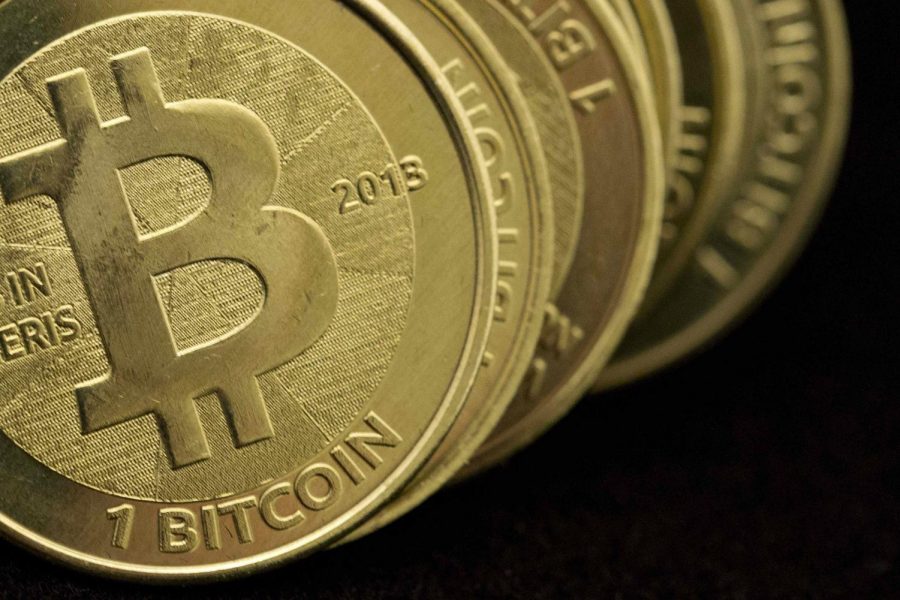Bitcoin: a Bubble Destined to Pop
January 3, 2018
Everyone is talking about it. Everyone. Initially, I knew that there was hype around it, listening to endless conversations about it at parties and in classrooms. But when my car-mechanic uncle (who has never made a financial investment in his life) called me and said, “Marc, what’s Bitcoin? I need to buy Bitcoin,” I knew that the hype had gotten out of control.
So, what is Bitcoin?
Bitcoin is a currency created by an unknown person in 2009. What is backing this currency? Nothing. Bitcoin is a cryptocurrency—a digital currency that is not printed, it is also not a hard metal, nor can it be exchanged for a hard metal because it has no intrinsic value. Anyone can create a cryptocurrency with the right code and community behind it. At the moment there exist over 1000 various cryptocurrencies of which Bitcoin is one. Bitcoin only exists over a network run by computers which keep track of any and all transactions. This is the concept of Blockchain—a database of all Bitcoin transactions. The advantage of Blockchain, or the main appeal behind Bitcoin, is that there is no single place where all of the information is stored. Having been copied millions of times, the transaction records are public, always updated, and no single person can wrongfully modify all of the copies. As a result, Bitcoin is not and cannot be regulated. There is no government body presiding over it. Theoretically, there is no one to stop Bitcoin from increasing in value forever.
How are Bitcoins ‘mined’?
To understand the process of mining Bitcoins, we need to understand how the Blockchain is a ‘chain.’ Every new set of transactions is a ‘Block. This ‘Block’ comes after the block that came before it (a set of transactions that occurred before that). As transactions occur overtime, a chain slowly forms. Simply put, what Bitcoin miners do is link the blocks together by putting the a string of numbers that identify the previous block through a mathematical formula, creating a new string of numbers to represent the newly added block. As a result, this ‘chain’ ensures that every block is legitimate, because every string of numbers is based on the string of numbers preceding it. As a result, transactions will not go through until the mining has occurred (due to lack of verification). As a reward for their ability to link the Blocks, the miners are rewarded with Bitcoins.
So, is there an infinite amount of Bitcoins to be ‘mined’?
The creator of Bitcoin defined how the rewards would diminish over time. In the beginning, the reward was 50 Bitcoins for every block mined. However, there exists a rule that for every 210,000 additional blocks mined the reward is halved. This ensures that after 64 ‘halvings’ the reward will be zero Bitcoins, locking the maximum number of Bitcoins to possibly exist at 21 million. At the moment, 12.5 Bitcoins are rewarded every 10 minutes. Today there are approximately 17 million Bitcoins in circulation. With only 4 million Bitcoins left unmined, various parties are in a race against each other to obtain the solutions and earn the remaining coins, as the reward diminishes over time.
How do I make money off of this thing?
The answer to that question is another question: how much money? You cannot get caught up in the hype. Do not be deluded by the teenagers buying Lamborghinis and having more money than what they know to do with. Bitcoin is not your way to make a fortune. That is because Bitcoin will NEVER succeed. This can be said with confidence as Bitcoin is not what it appears to be: a currency. It is a currency that is traded as a stock but is not a stock. The main issue with Bitcoin is its deflationary design. There is a finite amount of Bitcoins. This means that as the demand for Bitcoins goes up, the value of Bitcoin goes up. What does this mean? It means that there is no incentive for people to get rid of their Bitcoins when their price, by design, will increase. This inhibits what Bitcoin is made to be, a currency—something of value that changes hands and eliminates the need for a barter system. Finally, we have another critical issue: volatility. Throughout the day we can see the value of Bitcoin fluctuating dramatically, meaning that the value of Bitcoin is constantly changing. These fluctuations are bound to increase in magnitude as at the consequence of a greater popularity big players such as the U.S. Government and massive hedge funds enter the game. This is another major reason why Bitcoin will not succeed. Would you rather receive a hundred dollars or a hundred dollars of stock in a company? You would, of course, choose the hundred dollars, because tomorrow, your stock can be worth nothing. However, Bitcoin is even worse than a stock, because behind Bitcoin there is nothing. When I buy a stock, I am investing in the company and its product. I am putting my money on something that is a tangible asset.

Additionally and most importantly, Bitcoin’s price rise over the last few years is extremely similar to that of a typical bubble. Some indicators that Bitcoin is a bubble are the parabolic increases in price, non-investors getting involved, and ridiculous speculation. CNBC compared this bubble to that of Tulip Mania—a period of time in the seventeenth century when Dutch tulips exponentially increased in price until one day the entire tulip market crashed. In fact, right now banks are launching Bitcoin futures (ability to agree to buy or sell Bitcoin at a specific price sometime in the future), the Dutch did the same exact thing with tulips.
Okay, so should I bet against Bitcoin?
Despite all of its disadvantages, one cannot play against Bitcoin either. The momentum caused by the hype around Bitcoin is too great to derail. Bitcoin can decrease in value a finite amount, meaning that if you invest in it you can lose as much as you put in. However, it can increase an infinite amount, meaning that if you play against it you can lose an infinite amount of money. The decision regarding which side to play on is a no-brainer.
The winners of Bitcoin, the teenagers with the Lamborghinis, have become winners through sheer courage/stupidity. They have stumbled upon the currency at an early stage and hung on to their positions for dear life as it went through various panics and drops throughout its growth. They are by no means the majority. The majority of people are those who doubled their profits and got out or those who made a sensible decision and did not invest at all. All of them have gone on to regret their decisions, some even committing suicide over it. But the reality is that they had made a smart decision.
So, what do I do?
It is, therefore, that I encourage you to make a smart decision as well and to not put everything you have into Bitcoin. Do not get caught up in the hype. Do not get caught up in the regret of having missed the train to a lifetime of prosperity. A windfall with Bitcoin is not as ideal as it seems: with limitations on how many coins can be withdrawn at once, your money is locked in a very volatile investment. Additionally, if I begin to sell off $1 billion of Bitcoins, the first third of that will be worth more than the last third of that, as the transaction reduces the value of each Bitcoin. Bitcoin is a bubble, and it is destined to pop. The question is, how much money can you make before it eventually does? That is why, if you are going to play, you should play small. Play with pocket change, play with something that you are not scared of losing. Just ride the wave and make a quick buck to get your family something nice for the holidays.
Happy hunting.
For additional reading:
“How Do Bitcoin Transactions Work?”
“Statement on Cryptocurrencies and Initial Coin Offerings”

















































































































































